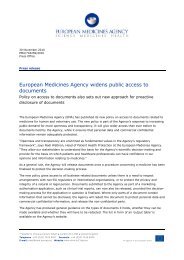1 Selective serotonin reuptake inhibitors (SSRI) â sales, withdrawal ...
1 Selective serotonin reuptake inhibitors (SSRI) â sales, withdrawal ...
1 Selective serotonin reuptake inhibitors (SSRI) â sales, withdrawal ...
Create successful ePaper yourself
Turn your PDF publications into a flip-book with our unique Google optimized e-Paper software.
Abraham and Davis have explored drug regulation in several studies demonstrating regulatory<br />
passive decision-making and accept of drug risks, which were largely unknown to the public<br />
(63) McGoey has identified “a will to ignorance” within regulatory bureaucracies with <strong>SSRI</strong>s<br />
risk and benefit balance as a case (64). Healy has also studied drug regulation in relation to the<br />
<strong>SSRI</strong>s and concludes that in the case of the <strong>SSRI</strong>s the current regulatory practice overstates the<br />
benefits and underestimates the risks of drugs (65). John Abraham (66) has suggested that drug<br />
regulatory decision-making may be understood in the light of a permissive principle, i.e. a<br />
tendency to permit a technology on the market, even if it does not meet established standards<br />
of efficacy and safety and in contradiction to the precautionary principle. Abraham (67,68)<br />
found that drug regulators tend to weigh the balance of scientific doubts about drug safety in<br />
favour of the manufacturer, both pre- and post-marketing. Further the report from the UK<br />
House of Commons describes several problems related to the close relation between the<br />
pharmaceutical industry and the regulatory body (60).<br />
43





